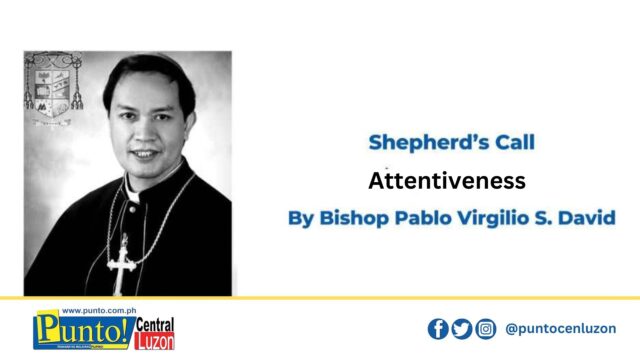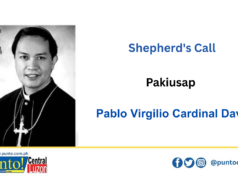SOMEONE ONCE asked me what our Kapampangan word for listening is. I said “Makiramdam.” He seemed puzzled because he knows that “makiramdam” is also a Tagalog word and it means “to feel.” So how do you say, “to feel” in Kapampangan?” was his follow up question. And I said, “makiramdam.”
It was only then that it dawned on me that in Kapampangan – listening “pakikinig” and feeling “pakikiramdam” were one and the same word. It means that for us, to listen is not only to hear with our ears but to feel with our whole being, to be sensitive, to pick up not just what is said but also that which is unsaid.
I think pakikiramdam comes closer to the kind of attentiveness that the Lord says we need in today’s Gospel, in order to be able to interpret the signs of his coming. Let me propose two points for reflection for this first Sunday of Advent. First, about the need to learn how to deal with distractions if we want to develop attentiveness. And second, about the discipline that comes with attentiveness, which includes concentration or focus, vigilance or alertness. There is a charismatic action song that says something like that. It says, “I am alive, awake, alert, enthusiastic…” Alive (you touch your toes), awake (your knees), alert (your shoulders) and enthusiastic (you wave your hands).
Let’s reflect a bit more on each one: first, about DISTRACTIONS. Obviously, “distracted” is the opposite of “attentive.” The first part of the Gospel has to do with dealing with the “anxieties of daily life…” It is warning us about allowing our hearts to get “drowsy from carousing,” such that we are prevented from paying attention to the signs of God’s coming. That is how the people in the time of Noah are described earlier in Luke chapter 17: that people were “eating and drinking, marrying and giving in marriage until the day Noah entered the ark…” And then in the next verse he says the same was true in the time of Lot, people were busy “eating, drinking, buying, selling, planting and building… until the day fire and brimstone rained down from the sky.” In short, they were complacent. And so, they were caught unawares and met a tragic end.
I checked the word “Carousing.” It means “engaging in noisy, carefree and boisterous partying, alcohol binge, or wild revelry.” The closest examples I can think of are those who indulge in loud karaoke or videoke sessions until the wee hours of the morning, not caring about disturbing the neighbors. To behave this way is to say, “I do not care.” It is the typical attitude of some people who are in power. They do not have a sense of accountability or responsibility towards anybody. Advent is a time to be reminded that there is going to be a day of reckoning!
And now let us reflect on the other discipline that comes with attentiveness: concentration or focus, vigilance or alertness. The image that comes to my mind is an adult circus tightrope walker teaching his nervous son how to walk on a tightrope and how to succeed in crossing over to the other end of the rope suspended between two posts. The father positions himself on the other end and asks his son to just feel the rope with his feet, not to look down or look around but to look ahead, to fix his gaze on the eyes of his father who is there waiting at the other side.
The other imagery which I have used very often has to do with the secret of winning the hit-the-pot game while blindfolded. The technique is simple: listen to only one voice you can trust—perhaps your father’s, and not to mind all others. Apply this now to the spiritual life. I think you will understand now if I say prayer is really about spiritual attentiveness. It has to do with familiarizing ourselves with God’s will, God’s ways, God’s voice. The problem is, the devil is often a “third-rate trying hard copycat.” Gaya-gaya siya. He tries to imitate or mimic God, precisely to mislead us or confuse us. That is why prayer is essential to our growth in another spiritual discipline: discernment, the capacity to sort out, to distinguish between what is from God and what is not from God.
If we do not have time anymore to be silent, to reflect and meditate, we will tend to be more easily distracted or misled. We will never learn to sort out the many voices that compete in our own heads. That is the reason why I keep telling you, that while it is natural to talk to God in in our prayer, what matters most is that we dispose ourselves to listen, to be attentive, when it’s God’s turn to talk to us. And so, we can never learn discernment without prayer, understood more basically as the exercise in listening to God.
(Homily for 1st Sunday of Advent, 1 Dec. 2024, Lk 21:25-28, 34-36)





